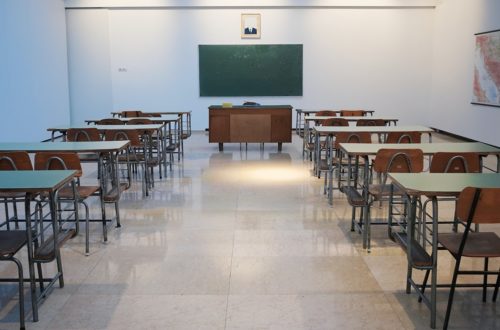You are relocating to France with your family? Then, finding a school for your children will be one of your first worries. You may want to consider enrolling them in a public French school, especially if they are still young.
The main advantage of enrolling your children into a French school is that they will become integrated into French society and become fluent in French much faster than they would at an international school. The younger the child is, the easier.
If you have children under the age of 11 years old, you will be interested in reading this article until the end as I will explain in detail the pre-school and primary public school in France: how it is organised and the enrolment process.
Table of Contents
School levels and curriculum
State-school teaches and follows the values of the French Republic. They may differ from other countries, as French secular law is deeply set in French culture.
All children are admitted and respected regardless of their origins, their religion, their nationality, their family status, their sex or any handicap they may have. Boys and girls are taught together. State schools are non-religious.
No adult or child is allowed to wear signs or clothing manifesting ostensibly their personal religious belief at school.
Preschool/nursery (école maternelle)
Ecoles maternelles provide care for children from three (sometimes two) years old until six years old.
While attending maternelle is not compulsory, education is mandatory by French law from the age of three. State schools are free and are an excellent way for expat young children to learn French easily.
The curriculum is organised into 5 main topics: oral expression, physical expression, artistic expression, exploring the world and starting to structure thoughts. Maternelle has 3 levels based on the children’s age:
- Petite section: age 3 to 4 years old
- Moyenne section: age 4 to 5 years old
- Grande section: age 5 to 6 years old
As the children develop their language abilities naturally at a young age, the first contact with a foreign language starts from the Moyenne section through songs and games.

Elementary school (École élémentaire)
Attending school becomes mandatory from the age of 6 in France until 16 years old for every child living in France.
Children learn the fundamentals at elementary schools such as reading, writing and counting. Early learning (artistic and fun) activities are also offered. One foreign language is introduced for about 1h30 per week.
There are five levels:
- Cours préparatoire (CP) : age 6 to 7 years old
- Cours élémentaire (CE1): age 7 to 8 years old
- Cours élémentaire (CE2): age 8 to 9 years old
- Cours moyen 1 (CM1) : 9 to 10 years old
- Cours moyen 2 (CM2) : 10 to 11 years old
The Primary school (école primaire) includes both the maternelle and elementary school.
Allophone children starting elementary school will have an assessment organised by the school to determine which class they should be in. This evaluation will be done according to their language skills, knowledge, personal development and their age. This assessment will be performed preferably in the child’s first language of education.
School enrolment process
Catchment areas
Public schools have catchment areas and you’ll be assigned to a school based on where you live. Your local Mairie will assign you to the relevant school and provide you with the contact details and pre-enrolment certificate.
If you want your child to go to a school outside of your area, you’ll need to have a good reason and get permission from your local Mairie (town hall) and the rectorate (schools inspectorate) via an exception request (demande de dérogation).

Pre-enrolment at your local Mairie
For both preschool and primary school, the pre-enrolment should be done at your local city hall (Mairie), if this is the first enrolment in a French public school. It should be done in May and June prior to the start of the school year. If it is done after, the school assignation may also take into account the number of pupils per school.
State school is free, however, lunch services are charged if provided. In some cases, a fee may be requested for the school manuals depending on the municipalities.
You’ll need the below documents for the enrolment:
- Your birth certificate (see INSIDER TIP 1). The certificate must mention:
- Your Date and place of birth
- Your gender
- Your father’s and mother’s name
- Your child’s vaccination certificate
These are the compulsory certificates to enrol in a French school. For children born after 20018: - Diphtheria, tetanus and poliomyelitis (DTP)
- Pertussis
- Type B Haemophilus influenzae
- Hepatitis B
- Pneumococcus
- Serogroup C Meningococcus
- Measles, mumps and rubella.
For children born before 2018: Diphtheria, tetanus and poliomyelitis (DTP)
- Proof of address less than three months old in your name:
- If you are a tenant: an energy bill such as electricity, gas, water, landline phone, Internet. CAREFUL: the mobile-phone bill is usually not accepted.
- If you are being hosted: a hand-written certificate of residence signed by your host + your host’s last energy bill + a copy of your host’s proof of identity
- School insurance (Assurance scolaire) – not mandatory but recommended.
INSIDER TIP 1
Birth certificates in any other languages should be translated into French by a sworn translator approved by a French Court of Appeal and in some cases apostilled or legalized (see INSIDER TIP 2).
INSIDER TIP 2
Birth certificates from certain countries are to be stamped with an “apostille” or legalized. In either case, this stamp certifies that the document is official. Some countries have bilateral agreements preventing their citizens from the need for apostille or legalization. Check out the first column of the Recap legalization table attached from page four, what letter matches your country line:
- D for Dispense: Exemption
- L for Legalisation: Legalization required
- A for Apostille
People who read this post also liked Everything you need to know about King’s Day in France
Guiga from Expat in France
School calendar
The French school year starts beginning of September and goes until the end of June, beginning of July. Four school holidays of two weeks each are intercalated every 6 weeks during the 10 months school year. France is divided into 3 zones to spread the winter and spring holidays over 4 weeks. This zoning system goes back to the ’60s for economic and touristic reasons.
- Zone A: Caen, Clermont-Ferrand, Grenoble, Lyon, Montpellier, Nancy-Metz, Nantes, Rennes et Toulouse.
- Zone B: Aix-Marseille, Amiens, Besançon, Dijon, Lille, Limoges, Nice, Orléans-Tours, Poitiers, Reims, Rouen et Strasbourg.
- Zone C: Bordeaux, Créteil, Paris et Versailles.
The school week is from Monday to Friday at most schools. Classes usually begin between 8 pm and 9 am and end between 4 pm and 6 pm for a maximum of 24h classes per week (this doesn’t include the péri-scolaire activities)
Depending on the municipality, schools can welcome children on Wednesdays.
I hope this information will help you to understand the French schooling system for younger children. I will soon prepare another article about middle school and high schools in France. Stay tuned!
If you have any questions, let me know in the below comments.




4 Comments
Sarah Horne
Hello 🙂
I’ve just crossed by this article. It interested me as a french teacher who is integrating a new pupil in a few weeks coming from a foreign country.
I just wanted to correct, if I may, the french secular law. It is the teacher who is not allowed to express his or her religious believes. The children are free to talk about their beliefs and religious culture as long as there are respectful towards other beliefs.
Mademoiselle Guiga
Hello Sarah,
Many thanks for your comment and for sharing your experience.
Of course, the secularism French law doesn’t go against the freedom of speech. My wording was incomplete, I’ll reword it. Thanks!
Indeed, the staff have a duty of strict neutrality and cannot manifest their political or religious convictions.
However, both kids and teachers cannot show their religious affiliation (by wearing visible religious signs like a kippah, the Muslim veil or a large Christian cross).
The secular law applies to all: students, teachers, everyone and in all public spaces beyond the school.
Katie Ketner
I need to a certificate of pre enrollment in one day for our visa appointment can you help me understand hot to get this?
Kristen
Hi Katie, I saw your comment regarding pre-enrollment in a French school for a Visa Interview. I’m in the same predicament and wondered what you learned and how it worked out for you. I appreciate any insight you could give. Thank you in advance!
Kristen